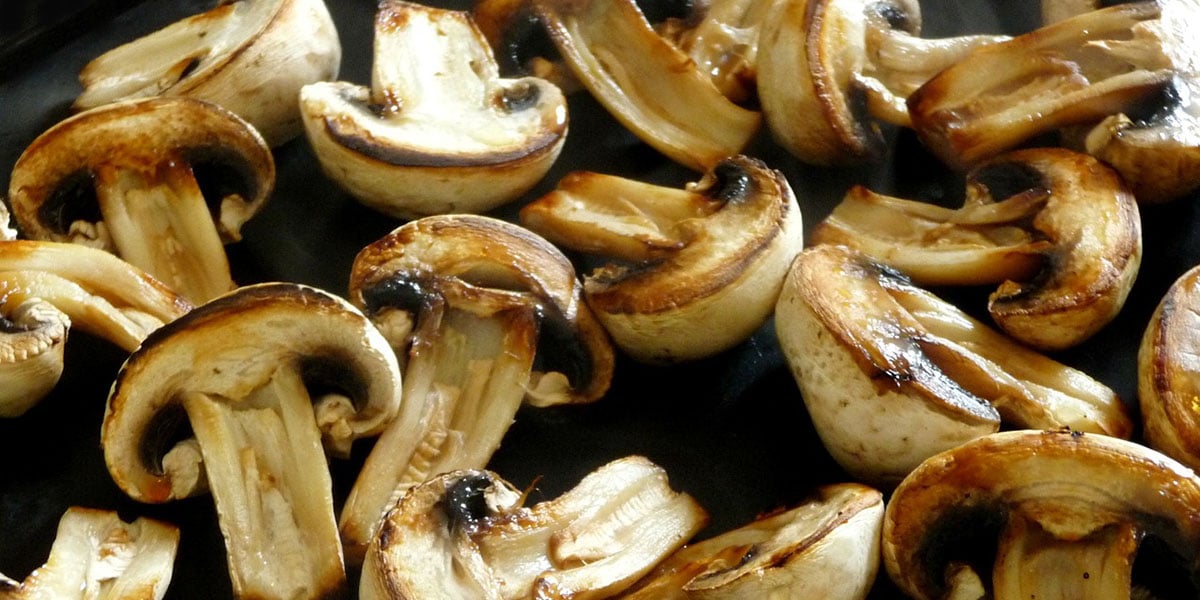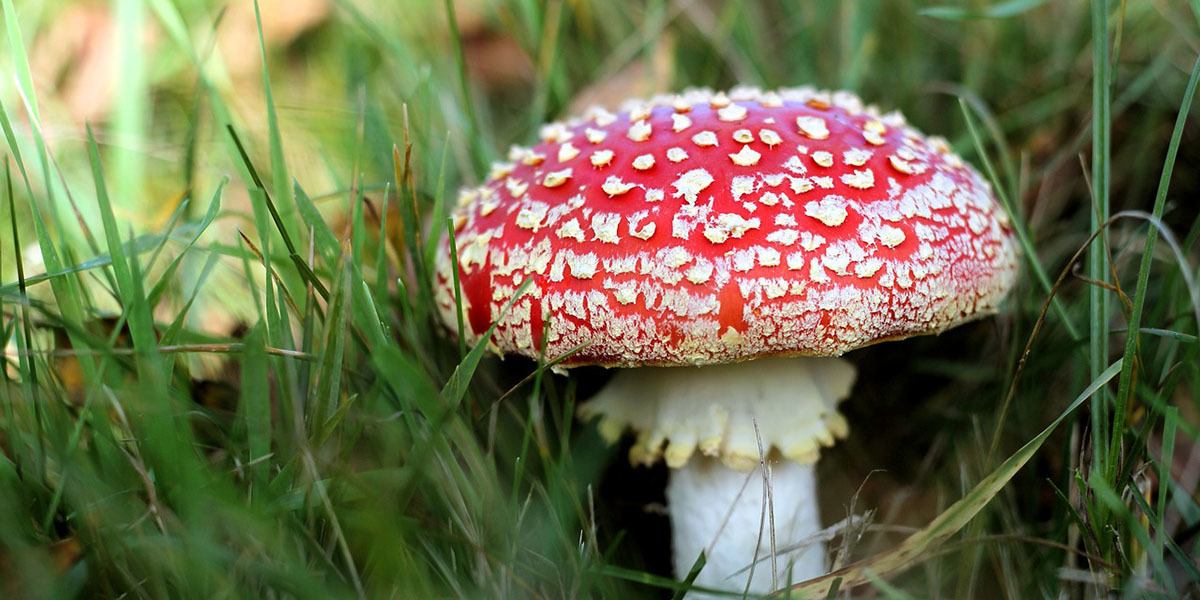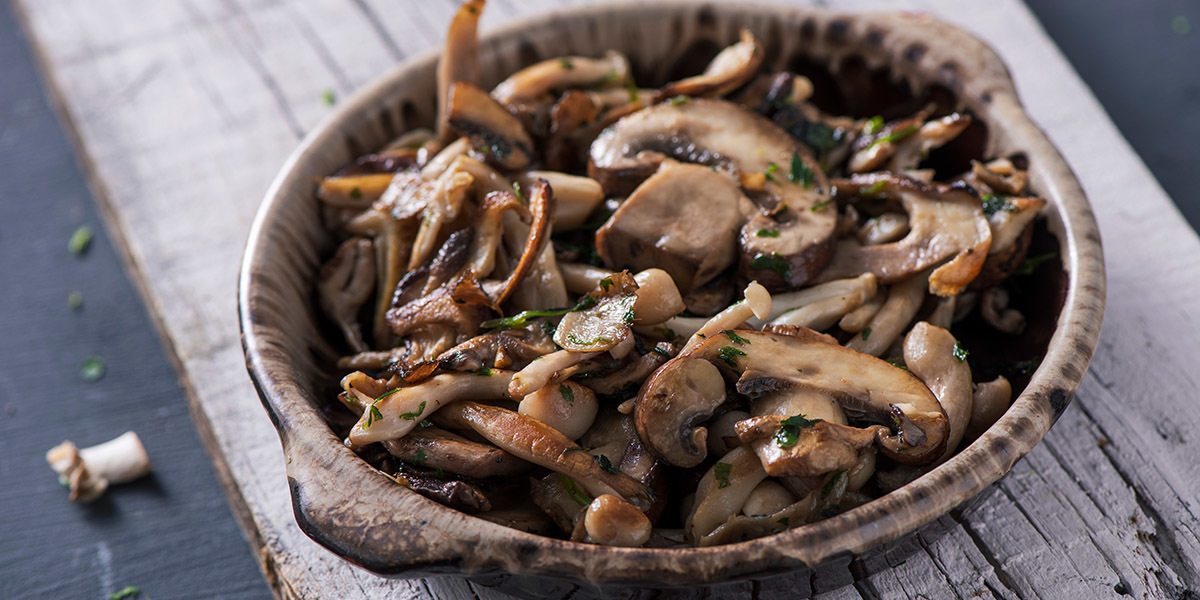You may have heard people refer to mushrooms as superfoods before.
There are some big claims made about the kind of health benefits that you can get from eating mushrooms. But how many of those claims are actually true?
Are mushrooms good for you? Mushrooms are low in calories, cholesterol, and sodium. But they’re also packed full of vitamins, minerals, and other nutrients. There is good scientific evidence to suggest that consuming mushrooms can help boost your immune system, fight cancer, control diabetes, and prevent obesity and heart disease.
Plus much more!
In this article, you’ll learn the wide range of nutritional and health benefits that mushrooms have. As well as how and why you may want to consider substituting mushrooms for some of the meat in your diet.
Nutritional Benefits Of Mushrooms

Let’s start off by examining the nutritional profile of mushrooms.
It’s easier to say what types of vitamins and minerals mushrooms contain, instead of trying to prove what kind of conditions they can prevent or cure.
Nutritionists normally tell us to stay away from white foods like bread, rice, refined sugar, and other simple carbohydrates.
White button mushrooms are the exception to the rule about white foods, as they’re full of more nutrition than even some fruits and vegetables and low in carbs.
Mushrooms are often called “functional foods.” That’s a food that has potential positive effects beyond just basic nutrition.
Take a look at the nutritional profile of one cup of raw white button mushrooms:
- 20 calories
- 0 grams of fat
- 3 grams of protein
- 1 gram of fiber
- 23% daily value of vitamin B2 (Riboflavin)
- 17% daily value of vitamin B3 (Niacin)
- 14% daily value of vitamin B5 (Pantothenic Acid)
- 13% daily value of selenium
- 13% daily value of copper
- 9% daily value of potassium
- 8% daily value of phosphorus
Mushrooms are naturally low in sodium, fat, and cholesterol.
There are many other varieties of mushrooms available besides button mushrooms. But most provide a similar nutrient profile, regardless of their size, shape, or color.
Mushrooms also contain antioxidants, which can help you lead a healthier, longer life. That’s because antioxidants protect cells from free radicals and oxidative stress.
The Importance Of B Vitamins

The wide range of B vitamins that mushrooms contain help form red blood cells, and also help your body to better absorb energy from other foods.
B vitamins are also important for brain health, and pregnant women are recommended to take folic acid. Something that mushrooms also contain.
Vitamin D
Interestingly, mushrooms increase in vitamin D concentration when placed in sunlight, just like humans do. In fact, mushrooms are the only vegan source of vitamin D aside from fortified foods.
Dairy products often contain vitamin D and can be a good source for vegetarians, but vegans don’t consume any animal products. So mushrooms can be a good way to add some vitamin D to a vegan diet.
Choline
Mushrooms contain an important nutrient called choline. Choline is found in high concentrations in eggs, liver, shellfish, and other meats. So another reason for vegans to eat mushrooms is to add some extra choline to their diet.
Choline is important for learning and memory, sleep, and muscle movement.
Selenium
Selenium isn’t found in most fruits and vegetables. Mushrooms are the second-best food source of selenium after brazil nuts. Selenium is a powerful antioxidant that prevents damage to tissue and cells and helps to support the immune system. It also strengthens hair, nails, teeth, and bones.
Fiber
Mushrooms are a source of both soluble beta glucans and insoluble chitin.
Insoluble fiber is necessary for human digestion. Soluble fiber helps your body to regulate blood sugar and helps avoid an insulin spike after a large meal. It can also help moderate cholesterol and blood pressure.
A 2014 study by the Czech Journal of Food Science found that wild mushrooms such as porcini are especially high in soluble fiber, but all mushrooms are good sources of dietary fiber.
In summary, mushrooms are low in calories but are packed full of nutritional value. They’re a great plant-based source of protein and fiber, as well as a wide range of vitamins and minerals.
Health Benefits Of Mushrooms

The health benefits of mushrooms ranges from simply improving overall health to treating and preventing serious health conditions.
So far, scientific research has identified over 100 beneficial effects that mushrooms can have on the body, and 200 different conditions that may benefit from mushroom consumption. Here are some of the key ones.
- For a comprehensive overview check out this article: Medicinal Mushrooms: The Complete Guide.
Fighting Cancer

One thing that medicinal mushrooms are best known for is their supposed cancer-fighting abilities.
So far, no type of mushroom has been proven effective at completely preventing or curing cancer on its own.
That isn’t to say that mushrooms don’t contain bioactive compounds that may help assist with cancer treatment in a number of ways.
Anti-tumor
Various mushroom species have been identified as containing anti-tumor compounds. Especially turkey tail mushrooms (trametes versicolor) and lion’s mane mushrooms.
Boosting Immune System In Cancer Patients
Mushrooms have been shown to boost the immune system of patients suffering from certain types of cancer.
Mushrooms also contain a type of protein called lectins which can bind to cancer cells and act as a signal to our immune system that they need to be destroyed.
Breast Cancer
In a study by the University of Western Australia, women who consumed 1/3rd of an ounce of fresh mushrooms and green tea every day were 64% less likely to develop breast cancer.
Leukemia
A compound called lentinan produced by shiitake mushrooms is known to suppress the growth and spread of leukemia cells.
Sources
https://www.ncbi.nlm.nih.gov/pmc/articles/PMC3339609/https://www.ncbi.nlm.nih.gov/books/NBK424937/
Controlling Diabetes

Eating mushrooms can help people with both type 1 and type 2 diabetes.
Those with type 1 diabetes can benefit from the high fiber content of mushrooms, which can help lower their blood glucose levels.
Those with type 2 diabetes get more stable blood sugar, insulin, and lipid levels from eating mushrooms.
Mushrooms are considered prebiotics. They can create subtle changes in the gut microbiome that alters the way your liver handles glucose.
This can make it easier to manage diabetes and other metabolic diseases.
Sources
https://www.medicalnewstoday.com/articles/322816.php
https://www.sciencedaily.com/releases/2018/08/180816105524.htm
A Healthier Heart

The antioxidants found in medicinal mushrooms like chaga can help lower your blood pressure, as well as your risk of stroke, heart attack, and other cardiovascular conditions.
The vitamin C, potassium, and fiber that mushrooms contain can all contribute to improved cardiovascular health.
Mushrooms are low in sodium but high in potassium. Your body uses potassium and sodium together to regulate blood pressure. In this way, mushrooms can help lower high blood pressure and prevent cardiovascular diseases.
Shiitake mushrooms are a good source of beta glucans. Ingesting 3 grams of beta glucans per day has been shown to lower cholesterol levels in the blood by 5%.
Mushrooms are a leaner source of protein than meat. They don’t contain any fat or cholesterol, and have only low amounts of carbohydrates. This helps to balance out LDL (bad) cholesterol and HDL (good) cholesterol, which is critical in preventing atherosclerosis and other cardiovascular diseases.
Sources
https://blog.providence.org/archive/mushroom-tea-a-fungi-new-way-to-give-your-morning-a-boost
Weight Management

Dietary fiber has been shown to play an important role in satiety (how full you feel after a meal).
Mushrooms contain two types of dietary fiber which can help to reduce appetite and act as a “bulking agent” in the digestive system.
After eating mushrooms you’ll feel fuller for longer. This can help reduce your overall calorie intake and promote weight loss.
Increases Iron Absorption
Mushroom contains copper, which has beneficial effects on the body.
Copper is necessary for your body to absorb iron from food and use it. A copper deficiency can lead to neutropenia (a low white blood cell count) and anemia (a deficiency in red blood cells caused by low iron levels.)
Since mushroom also contains high levels of iron along with copper, the two metals can work together very easily since your stomach is receiving both at the same time.
Increases Nutrient Absorption
Vitamin D helps with the absorption of certain minerals, especially calcium and phosphorous.
Mushrooms also contain good levels of phosphorous and calcium in addition to vitamin D.
So just as the copper in mushrooms allows for better iron absorption, the same sort of mechanism is at work with vitamin D.
General Immune System Boosting

Mushrooms can help to boost your immune system in several ways.
Studies have shown that even white button mushrooms have anti-inflammatory power, while other mushrooms like shiitake give a general immunity boost. They may even be able to help prevent respiratory infections.
Porcini, oyster, lion’s mane, tremella and shiitake are all high in antioxidants that could help you live longer.
The selenium in mushrooms helps improve your immune system by increasing the production of T-cells, a type of white blood cell that kills viruses and tumor cells in your body.
Mushrooms have natural antifungal and antibacterial property. So they can act as natural antibiotics to stop fungal infections and microbial growth within your body. They can even heal ulcers and prevent them from becoming infected.
Sources
https://www.ncbi.nlm.nih.gov/pmc/articles/PMC4684115/
https://www.ncbi.nlm.nih.gov/pmc/articles/PMC1160565/
https://www.healthline.com/health/food-nutrition/best-medicinal-mushrooms-to-try
https://www.sciencedaily.com/releases/2015/04/150416112826.htm
Summary – Medicinal Benefits Of Mushrooms
Mushrooms already look very promising when it comes with helping to prevent or cure several conditions and diseases.
Medicinal fungi have a long history in traditional medicine of Asian countries that stretch back thousands of years, and modern medicine is only now starting to catch up.
Many mycologists (scientists who study fungi and mushrooms) believe we still have a lot to learn about the nutritional and health benefits of consuming mushrooms.
In the years to come, as more research is dedicated to studying the health benefits of mushrooms, expect even more information to come out.
You can expect mushrooms to play a larger role in anti-tumor and anti-cancer medications and other medicinal applications in the future.
Mushrooms As A Meat Substitute

Substituting mushrooms for meat has been a common practice of vegetarians and vegans for years.
Now using portobello mushrooms as burgers in place of beef patties is becoming quite the trend. And with good reason!
A study in 2013 instructed a group of obese people to eat less meat and substitute mushrooms into their diet in its place. After one year, most of the subjects had lower blood pressure and cholesterol levels, less incidents of diabetes, and weighed 7 pounds less on average.
While we often think of mushrooms as just another vegetable in the culinary world, they aren’t actually plants. Fungi is an entire different kingdom of life, and is actually closer to animals than plants in evolutionary terms.
Mushrooms are an interesting mix between the best of both plants and animals in terms of nutrition.
They contain high levels of protein, iron, and B vitamins that fruits and vegetables often lack. Yet mushrooms are also high in antioxidants just like peppers, tomatoes, and carrots.
Eating mushrooms will never be a complete nutritional substitute for meat. Meat still has higher amounts of protein, zinc, and other nutrients.
But mushrooms can add a texture similar to meat, as well as a meaty flavor called “umami.” That makes them a great meat substitute in casseroles, chili, pasta sauces, and other recipes that traditionally call for ground beef or other kinds of meat.
That’s why mushrooms are a great alternative for vegans. If you are vegen you can try these 25 Of The Best Vegan Mushroom Recipes.
If you want to just add mushroms to your diet check 30 Of The Best Mushroom Recipe Ideas.
You don’t have to remove meat from your diet entirely. However, red meat has been linked to cancer, heart disease, and other conditions.
The American Institute for Cancer Research suggests eating no more than 18 ounces (510 grams) of red meat per week to reduce your risk of colorectal cancer and other forms of cancer.
So you may want to reduce the amount of red meat you eat by replacing half or even a quarter of the meat with mushrooms. That will lower the cholesterol, calories, and fat in the dish while still retaining that delicious meat flavor that you love.
If you do want to transition to a full vegetarian or vegan lifestyle, you can supplement the low calories of mushroom by adding beans or nuts into your diet.
Potential Health Risks Of Consuming Mushrooms

Cultivated mushrooms are generally safe to eat. But you should exercise caution when eating wild mushrooms. Don’t eat mushrooms that you find yourself unless you can 100% positively identify them.
Some edible mushrooms can appear very similar to poisonous ones, so it’s best to consult an expert before eating any wild mushrooms. Some mushrooms are toxic and the effects can range from severe cramping and diarrhea to organ failure and death.
If you harvest wild mushrooms, be sure not to pick them from alongside motorways or areas with lots of vehicle traffic. The exhaust from cars and trucks can release heavy metals that get absorbed into mushrooms and nearby vegetation.
- Read my comparison guide of What Is A Toadstool? Toadstools vs. Mushroom
Beta Glucans
The beta glucans (a type of dietary fiber) found in mushrooms are safe for most people to consume.
But beta glucans can stimulate immune function, which can be dangerous for people with autoimmune diseases like asthma, multiple sclerosis, lupus, or rheumatoid arthritis.
So it’s recommended that people with these conditions add mushrooms to their diet gradually to avoid any adverse effects. Stop consuming mushrooms and consult a doctor in case of any symptoms of an allergic reaction.
Agaritine In Button, Cremini, and Portobello Mushrooms

Button mushrooms are sometimes presented raw on vegetable platters alongside other raw veggies like peppers, carrots, celery, and broccoli. But there is a good reason why I would recommend against consuming raw button mushrooms.
Button mushrooms, cremini, and portobello mushrooms are all from the species Agaricus bisporus which contains a mycotoxin (fungal poison) called agaritine.
Agaritine is known to cause several different forms of cancer and mutations in both mice and people. Your liver essentially breaks agaritine down into hydrogen peroxide, which then starts damaging the DNA in your body.
To safely eat button mushrooms, cremini, or portobello mushrooms, you should really be boiling them first.
Approximately 50% of agaritine in button mushrooms is degraded after 5 minutes of boiling, but it takes as much as 2 hours to degrade 90% of the agaritine content.
Baking mushrooms reduces agaritine content by about 25% so it isn’t a great option. Microwaving button mushrooms cuts their agaritine content by about 33%, which isn’t fantastic either.
Frying mushrooms reduces agaritine by between 35% and 70%.
Just putting your button mushrooms in the refrigerator or freezer can also help reduce agaritine content by between 20% and 75%.
So overall, the safest way to reduce agaritine content when eating button mushrooms is to refrigerate or freeze them first, and then boil and/or fry them (ideally both) for as long as possible.
Personally I’ve just removed agaricus mushrooms from my diet almost entirely, opting instead to eat oyster mushrooms or other varieties that don’t contain agaritine.
It’s not just portobello mushrooms that contain toxins however. Many mushrooms contain toxins in their raw state, so I’d always recommend cooking mushrooms before eating them.
So now you know more about the wide range of nutritional and health benefits that mushrooms have. If you feel it is time to eat more of them check out some oyster mushroom recipes.
If you still have questions or want to learn more about mushrooms check these articles:

Pingback: Medicinal Mushrooms: The Complete Guide - GroCycle
Pingback: Are Mushrooms Vegan? - GroCycle
Pingback: CBD Plus Immune Support | Utoya by Jenny
Pingback: Mushroom | Utoya Organics
Pingback: The benefits of Mushrooms | Utoya Atlanta
Pingback: The Benefits of Mushrooms - Patti's CBD
Pingback: Health Benefits of Mushrooms - Utoya Pro
Pingback: The Health Benefits of Mushrooms - Utoya CT
Pingback: 30 Of The Best Mushroom Recipe Ideas - GroCycle